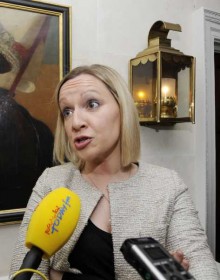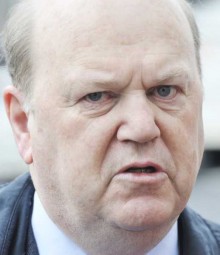14 May 2012
The Scary Times: The ‘Yes’ ministers in their own wild words
Be afraid, be very afraid

In 2009, Fine Gael promised that we were voting “Yes to recovery” and “Yes to Jobs” – there has been no real recovery in the economy since then
WITH less than three weeks to go to referendum voting day on May 31st, the 'Yes' campaign scaremongers were in top gear all weekend.
A scrum of ministers emerged to do media events. None though was making the argument for a ‘Yes’ vote, turning instead to a series of dire warnings for what would happen if voters have the temerity to say ‘NO’ to the EU Austerity Treaty.
Eamon Gilmore, Pat Rabbitte, Lucinda Creighton and Michael Noonan were all busy fanning the flames of fear. Rather than have you trawl through story after story, here’s a summary of a weekend of Labour and Fine Gael ministers attempting to out-do each other in the ‘Be afraid, be very afraid’ school of referendum hype.
No facts, precedents or statistics were presented with any of these claims over the weekend, so we have (where possible) added some of those crazy facts and figures stuff that mess up the fear factor.
Minister Lucinda Creighton dressing us in sackcloth and ashes
 “We’ll have to go
round with a begging bowl if we reject the treaty.”
“We’ll have to go
round with a begging bowl if we reject the treaty.”
“We will actually eliminate ourselves from any future stimulus package if we say no to that treaty.”
“The dangers of a Greek-style flight of capital from our banks is a very real – a very imminent – issue'.”
A ‘NO’ vote would “choke confidence, choke growth and employment, you will have higher taxes and lose jobs”.
Let’s take a look, Lucy.
In 2009, Fine Gael promised that we were voting “Yes to recovery” and “Yes to Jobs”. There has been no real recovery in the economy since then. In September 2009 (the second Lisbon Treaty referendum), the total Live Register figure for unemployment in the 26 Counties was 429,900 (12.7%); in April 2012, it was 436,000 (14.2%).
These figures are masking significant emigration out of the state. Last September, the CSO reported that up to 110 people were leaving the state early. So will a Yes vote really change this reality.
Even Irish Small and Medium Sized Enterprise Association (ISME) Chief Executive Mark Fielding acknowledged over the weekend:
“The headline unemployment figure masks the true level of unemployment which is under-reported through increased emigration, increased participation on state training initiatives and a significant rise in individuals remaining in education. The true picture in the jobs market is that well over half a million of our citizens are out of work.”
Minister Pat Rabbitte’s Moses map
“Ireland would be voluntarily walking into an economic desert.”
Er, Pat, the international economy is in crisis. Britain has entered a double-dip recession. The eurozone is (according to a Reuters report today) undergoing a “slow-motion recession”. In China and India, growth rates are decreasing. The price of oil is cripplingly high.
In Ireland, the vast majority of people have less money to spend because of tax hikes and stealth charges siphoning away their disposable income. So they are cutting spending in shops which means fewer jobs and more unemployment. So maybe we are already in the desert, Pat. Where is Pat's Promised Land?
Minister Joan Burton with that old number ‘the multinationals won’t be happy if . . .’
 “We’re selling ourselves as a solid base for
European expansion . . . To pull back from Europe would place all that in jeopardy.”
“We’re selling ourselves as a solid base for
European expansion . . . To pull back from Europe would place all that in jeopardy.”
“Multinationals prize stability above all else, they look for certainty and, in particular, the certainty that Ireland retains the insurance policy of access to the ESF and structural funding.”
This treaty is not about ‘Yes’ or ‘No’ to continued EU membership.
It is not about accepting or rejecting the euro.
It is not about an end to the EU single market.
Voting ‘No’ does not end any of these things. The treaty referendum on May 31st is about enshrining constricting budgetary strategies into the Constitution.
Britain isn’t party to this treaty, isn’t part of the euro but is part of the EU and, strangely enough, there’s no scare talk about any multinationals leaving Britain.
Minister Eamon Gilmore’s perfect storm
“If the Stability Treaty is defeated . . . it won’t be business as usual.”
“A defeat of the treaty has enormous consequences.”
“This country will be back in the eye of the storm on the first day of June.”
Maybe Eamon’s specs are all misted up and he hasn’t noticed that the eye of the storm is now looming over the Spanish economy. Spain’s government are supporting the treaty, are on the austerity treadmill, and still face a financial meltdown crisis. So how will it get worse if we vote No?
Minister Michael Noonan’s French lesson
 “It is incorrect to say the French election
was a vote against austerity . . . There was no austerity in France.”
“It is incorrect to say the French election
was a vote against austerity . . . There was no austerity in France.”
“Anyone with any bit of sense knows that a ‘No’ vote is going to make the Budget more difficult.”
Okay, Michael, how come, last November, French Prime Minister Francois Fillon announced a €100billion euro cut in his government’s spending? His aim was to eliminate France’s budget deficit by 2016.
The French Government proposed raising the retirement age from 60 to 62 by 2017. VAT rates on some goods were to be raised from 5.5%to 7.0%. Corporate taxes would rise temporarily by 5.0% on large businesses with annual turnovers of over €250million. No, this doesn’t look like austerity at all.
Michael should take more time out to talk with his Labour colleagues who have appear to have accepted that the French election result changes things and the Hollande campaigned on a platform of amending the treaty.
Even if we vote ‘Yes’, there will be more cutbacks in December’s Budget – so why is Noonan blaming it on the ‘No’ voters?
Follow us on Facebook
An Phoblacht on Twitter
Uncomfortable Conversations

An initiative for dialogue
for reconciliation
— — — — — — —
Contributions from key figures in the churches, academia and wider civic society as well as senior republican figures





